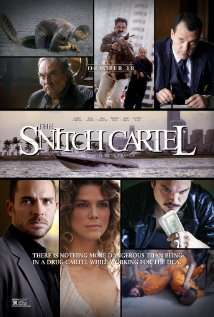The Snitch Cartel
| The Snitch Cartel | |
|---|---|
 Film poster | |
| Directed by | Carlos Moreno |
| Produced by | Manolo Cardona |
| Written by |
Luiso Berdejo Juan Camilo Ferrand |
| Based on | El cartel de los sapos by Andrés López López |
| Starring | Manolo Cardona |
| Cinematography | Mateo Londono |
Release dates |
|
Running time | 81 minutes |
| Country | Colombia |
| Language | Spanish |
| Box office | $2.1 million[1] |
The Snitch Cartel (Spanish: El Cartel de los Sapos) is a 2011 Colombian crime film directed by Carlos Moreno. The film was selected as the Colombian entry for the Best Foreign Language Oscar at the 85th Academy Awards but did not make the final shortlist.[2]
The film, like the 2008 Caracol TV series El Cartel, is based on the 2008 novel by the same name by Andrés López López, alias Florecita ("Little Flower"), a former drug dealer who, while in prison, wrote the fictionalized account of his experiences in the Cali Cartel and of what happened within the Norte del Valle Cartel.[3][4]
Plot
Two friends enter the illegal drugs business, one of them is a lower class boy, Martin, alias Strawberry, a smart and skilled young man seeking to earn money to gain the attention of his childhood love, Sophia. His new boss, Óscar Cadena, makes a plan to take down the powerful Medellin Cartel, that is headed by the infamous don Pablo Escobar, while Martin moves up fast in the syndicate, becoming a vital part of the growing North Valley Cartel, he begins a turbulent life in the midst of a cartel war that Martín that he is uncanny to take part, forcing him to move to Mexico looking for allies while struggles between the money and power that he now owns, and becoming a sapo (snitch) for the DEA, to protect his beloved Sofia.[5][6]
Cast
- Manolo Cardona as Martin
- Tom Sizemore as DEA Agent Sam Mathews
- Juana Acosta as Sofia
- Kuno Becker as Damian
- Diego Cadavid as Pepe Cadena
- Robinson Díaz as El Cabo
- Julian Arango as Guadana
- Andrés Parra as Anestesia
- Fernando Solórzano as Oscar Cadena
- Juan Pablo Raba as Pirulo
- Ilja Rosendahl as Prison Guard
- Jhonny Rivera as Antonio Villegas
- Pedro Armendáriz, Jr. as the Mexican Drug Lord Modesto[7]
Associated media
In addition to the aforrmentioned 2008 book that inspired both the 2011 film and the 2008 TV series, Lopez has written several additional books about his and his associates' experiences in the drug trade.[8][4]
See also
- List of submissions to the 85th Academy Awards for Best Foreign Language Film
- List of Colombian submissions for the Academy Award for Best Foreign Language Film
References
- ↑ "The Snitch Cartel (2013)". Box Office Mojo.
- ↑ De La Fuente, Anna Marie (20 September 2012). "Colombia's 'Cartel' up for Oscar consideration". Variety. Reed Business Information. Retrieved 21 September 2012.
- ↑ Iaconangelo, David (7 August 2013). "Lifestyle: Andres Lopez Lopez: The Journey Of A Colombian Drug Lord Turned Bestselling Author Of 'El Cartel De Los Sapos' And The Upcoming 'Lord Of The Skies' PROFILE INTERVIEW". Latin Times.
- 1 2 Elfrink, Tim (10 February 2011). "ANDRES LOPEZ EXPOSES THE COLOMBIAN CARTELS". Miami New Times.
- ↑ http://www.miaminewtimes.com/news/andres-lopez-exposes-the-colombian-cartels-6379735
- ↑ http://www.latintimes.com/andres-lopez-lopez-journey-colombian-drug-lord-turned-bestselling-author-el-cartel-de-los-sapos-and
- ↑ http://www.hollywoodreporter.com/review/snitch-cartel-film-review-390628
- ↑ "Author profile". Goodreads.